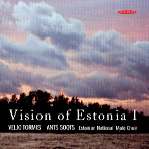Estonian Veljo Tormis (b. 1930) is among today’s more significant composers, and as this disc shows–to astonishing effect–he’s one of the world’s most profoundly exciting masters of choral writing. The music is technically difficult yet tonal, complex yet unfailingly accessible. The recording itself is one of this year’s memorable surprises, with transcendent performances and music that’s perfectly crafted to explicate the vivid texts and to exploit the power, texture, timbre, and range of male voices. Tormis is known for his intense interest in folk music and in the old stories and legends that infuse the national traditions of his homeland. The results in his music, especially evident in these a cappella vocal works, is an extroverted, highly expressive style that includes wonderful coloristic effects, created both through traditional means of harmony, rhythm, and carefully devised textures and voicings, as well as by requiring the singers to make “non-musical” sounds such as whispers, speech, shouting, or wailing glissandos (all of which, by the way, is used sparingly and never gratuitously).
These works, which employ texts of many different national poets as well as a Latin translation of sections of the Finnish epic, Kalevala (which features screaming whistles that will jolt you right out of your seat!) are rooted not only in Eastern European traditions of chant and folk music (set to strong, characterful melodies and full-textured harmonies), but also in Tormis’ uniquely varied and often startling methods of enlivening the words with highly specific inflection and dynamic changes. To this composer, the words are not just a vehicle for his music, they are the essence, and even though we may not understand them, no one who hears these pieces will miss the point of what’s being sung.
And the singing–well, it’s nothing short of extraordinary, the kind you hear once in a thousand recordings. This is a choir of long experience, manned by first-rate singers, led by a superb conductor who possesses a consummate understanding of beautiful sound, ensemble blend, and of how to excite an audience. The repertoire demands hearing and re-hearing. From the short opening piece (I’d like to sing a song)–which begins with a soft chanting and then suddenly breaks into a heaven-shaking burst of ravishing harmonies–to the stirring title work, Vision of Estonia, to the delightful, humorous closer (A conscript’s escape from Toompea Castle home to Kuusalu), we are taken on an unforgettable journey into territory that’s so full of interesting scenes and experiences that we have to return several times to get the full effect. It wouldn’t be a stretch to compare this music and its inherent physicality and spirit to that of the Welsh male choirs–especially in its passionate feeling for words and uninhibited, fervent expression both of the heroic and the melancholy. The sound is ideal–so vibrant you can feel it. Complete texts and translations are included. Don’t even think of missing this one. [3/14/2002]
































